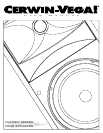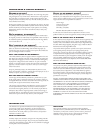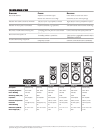
3
Cerwin-Vega is constantly striving to maintain the highest consumer standards. As a result of these efforts, modifications may be made from time to time to existing products without prior notice.
Specifications and appearance may differ from those listed or shown in this manual.
CLSC-6C CLSC-6 CLSC-10 CLSC-12 CLSC-15 CLSC-215
Description
Frequency Response
Power Handling
Sensitivity (2.83V/1m)
Impedance
Crossover Frequencies
Protection
Video Shielding
Dimensions (HxWxD)
Gross Weight (lbs.)
Dual 61⁄2" 2-way
50Hz - 20kHz
125 watts
90 dB
8 Ω compatible
2 kHz
Yes (High freq. only)
Ye
s
8" x 22.7" x 9.5"
27 lb.
61⁄2" 2-way
50Hz - 20kHz
100 watts
88 dB
8 Ω compatible
2 kHz
Yes (High freq. only)
Ye
s
15.4" x 8" x 10.45"
20 lb.
10" 3-way
38Hz - 20kHz
200 watts
90 dB
8 Ω compatible
380 Hz / 2.4 kHz
Yes Fuse (system)
No
33" x 12.2" x 11"
48 lb.
12" 3-way
28Hz - 20kHz
300 watts
92 dB
8 Ω compatible
380 Hz / 2.4 kHz
Yes Fuse (system)
No
37" x 14" x 11.7"
57 lb.
15" 3-way
26Hz - 20kHz
400 watts
94 dB
8 Ω compatible
280 Hz / 2.4 kHz
Yes Fuse (system)
No
40" x 16.5" x 16.6"
80 lb.
Dual 15" 3-way
24Hz - 20kHz
400 watts
96 dB
8 Ω compatible
280 Hz / 2.4 kHz
Yes Fuse (system)
No
51.5" x 16.5" x 19"
111 lb.
CLSC-112S CLSC-115S
Description
Frequency Response
Power Handling
Subsonic Filter
Crossover Frequencies
Polarity Switch
Voltage
Dimensions (HxWxD)
Gross Weight (lbs.)
Subwoofer
28 Hz to 150 Hz
250 watts
18 dB per octave below 28 Hz
Continuously variable from 40 Hz to 150 Hz
0 or 180 (user Selectable)
115 / 230 VAC Selectable
19"x17"x17" / 48.3cmx43.2cmx43.2c
m
46 lb (20.8 kg)
Subwoofer
25 Hz to 150 Hz
300 watts
18 dB per octave below 25 Hz
Continuously variable from 40 Hz to 150 Hz
0 or 180 (user Selectable)
115 / 230 VAC Selectable
23.5"x18.75"x18.75" / 59.7cmx47.6cmx47.6cm
64 lb (29 kg)
TROUBLESHOOTING
SYMPTOMS
Bass sounds distorted
Distortion with volume control near minimum
Distortion on music peaks or sound effects
Buzz, hum, or crackle when connecting wires
Buzz or hum when system is on
No sound after listening at high levels
CAUSES
Amplifier is at maximum output
Receiver tone controls are set too high
Defective receiver or preamplifier, or shorted
speaker wires
Defective receiver or preamplifier, or shorted
speaker wires
Defective receiver or preamplifier, or shorted
Dynamic soundtrack (e.g., explosions)
Connecting wires with power on causes transient
signal spikes
Connecting wires with power on causes transient
signal spikes
Connecting wires with power on causes transient
Amplifier’s thermal protection has been
temporarily activated
Amplifier’s thermal protection has been
temporarily activated
Amplifier’s thermal protection has been
SOLUTIONS
Lower volume or receiver level control
Set bass flat; use tone controls sparingly
Repair defective receiver, preamplifier or replace
speaker wires
Repair defective receiver, preamplifier or replace
speaker wires
Repair defective receiver, preamplifier or replace
Turn down volume control to lower overall range
Connect wires only when system power is off
Lower subwoofer volume and allow amplifier to
cool down; sound should resume automatically
Lower subwoofer volume and allow amplifier to
cool down; sound should resume automatically
Lower subwoofer volume and allow amplifier to






